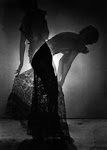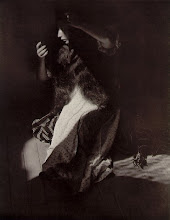Dreams in Celluloid, Part I
This is the first installment of an extensive list I'm currently compiling about my favourite directors. I tried to limit the list to 50, but that was just impossible. There are simply too many great films. So in the end, I enlarged it to cover 100 directors with my favourite film by each of them. There are still directors I would have liked to have included - Mike Leigh, Harmony Korine and Nuri Bilge Ceylan for instance - but when I really thought about the films that have made the greatest impression it's those in the top 100 are the films that continue to make me fall in love with cinema. I also avoided included filmmakers, whose work doesn't lie predominantly in film, so for example, while I admire the film work of Marcel Duchamp and Fernard Léger and their influence on later film, I consider them first and foremost artists. That said, I do view film as art and the directors I've included are all primarily concerned with furthering the limits of filmmaking as an art form. Some of the choices may perhaps be obvious to film lovers, but hopefully there are few strange names that reflect my own personal experience with cinema.
Claire Denis is a filmmaker who certainly puts cinematography over narrative. Her films work best when nobody is talking and camera does all the work and it’s quite impressive the tension she can build up this way. She’s like a better version of Lynne Ramsay, and probably a big influence on her as well. S’en fout la mort is about cockfighting, but it’s not really about cockfighting because that’s just a front for everything else that’s going on… or something like that.

Andersson is probably one of the few, contemporary directors who can actually make an interesting surreal/satirical film. Songs from the Second Floor is hilarious. The characters are all awful, self-obsessed crazies, who have no regard for anything else going on around them. There’s some singing on a train as well.
Strange, farcical and surreal. They’re all mad. The characters, the filmmaker, hell, even the viewers end up mad. So it’s a little bit all over the place and perhaps Jakubisko wants to say too many things at once – a little bit of social commentary, a big of drug abuse, a ménage-a-trois storyline. But, it’s the first Jakubisko film I saw, and while his later films may undoubtedly be greater realisations of his skills as a director, I still have certain fondness for this trippy tale.
Angelopoulos is a brilliant photographer, I’m not sure I would have enjoyed this film without the sheer magnificence of every shot. The stories not as wild as anything by Kuristica, the characters lack structure and there’s little philosophical insight into the plight of the Greek refugees when compared with his earlier films, yet there’s something highly original about Angelopoulos’ various depictions of his country’s history that stands as testament to his ability as an inventive auteur. Maybe you have to know about Greek history beforehand to really appreciate his funereal storytelling, but regardless of that one of my favourite things about film is cinematography. If it’s got enough pretty pictures, I’m taken (as this list probably demonstrates), so Weeping Meadow pretty much forces itself onto this list through images alone.
There are few other filmmakers that have the kind of cult appeal to mass audiences as Tarantino. There’s definitely something very cool about his films, which so many others only dream of, and the coolest of them all has to be Pulp Fiction. Witty dialogue, good music, a little bit of storyline, and now countless spoofs. ‘Bring out the Gimp.’
Oh it’s got dancing and cabaret and the beautiful Anouk Aimée and it’s very, very French, you know a little bit camp, a little bit silly, but exquisitely charming. It’s also a little bit less Hollywood musical inspired than Demy’s later features like The Umbrellas of Cherbourg and The Young Girls of Rochefort which I like, just not as much as Lola. Again beautiful, seductive black and white cinematography.
Let’s make a film about a comatose patient and her nurse, but make sure it’s funny, and throw in a few surreal, dreamlike passages to really hook people, but above all let’s make it an emotionally wrought drama, which fringes on something psycho-sexual or what not. At least, that’s what I imagine Almodóvar was thinking before he made this one. And yes I prefer Talk to Her over All About my Mother.
One thing to do when you told you’re HIV positive is to buy a small house with a garden and make a film where the Virgin Mary is a modern day celebrity, Mary Magdalene is a past-it drag queen, three Santa Clauses pay baby Jesus a visit and Judas makes credit card adverts. Read into the symbolism what you will, but few others would dare to make such an outrageous, but particularly personal film about homosexuality as this. Jarman’s other films are equally creative, especially Blue, which is one of the most poignant films I’ve ever seen and some people don’t even consider it a film.
Sexual tension runs riot in Shindô’s Onibaba, packed full with plenty of erotic symbolism from the swirling reeds to the dark pit, and then there’s also the bitter jealousy between mother and daughter, intrigue in a wayward soldier and plenty of dark, atmospheric horror. Shindô’s other films never quite reach the same intensity, but are beautiful in their own right, from his quietly moving, family drama Naked Island to his powerful look at a Japan devastated by the A-bomb in Children of Hiroshima.
I had low expectations for this film when it was recommended to me. Another surrealist look at dreams and what not. Yeah, right… And then I watched it and I felt bad for doubting that it could be so amazing. Sure, it’s light-hearted, but it’s also very entertaining and not in a trashy way either. Gondry has some serious points to make to, but what really makes the film are the more endearing moments in the relationship between Stéphane and Stéphanie. I suppose he also made Eternal Sunshine of a Spotless Mind, but I assumed that most of the creativity was from Kaufmann, how very wrong I was.












0 comments:
Post a Comment